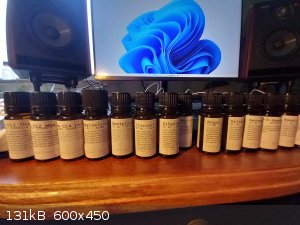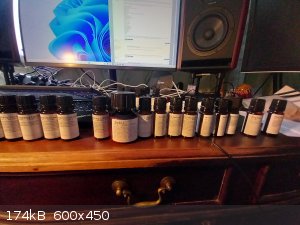| Pages:
1
2
3 |
DocX
Hazard to Others
  
Posts: 179
Registered: 22-10-2015
Member Is Offline
Mood: No Mood
|
|
How about just making benzaldehyde from bensyl alcohol? Sure has a nice smell of Amaretto liquor  . .
|
|
|
Fantasma4500
International Hazard
    
Posts: 1681
Registered: 12-12-2012
Location: Dysrope (aka europe)
Member Is Offline
Mood: dangerously practical
|
|
combining HCl or NaOH with acetone and letting it sit for a while (maybe some sunlight for good luck)
forms an oily compound, phorone or something like it, i remember long ago i had wiped some of this off on a piece of paper towel and on a hot summer
day it was drying near a window and as i woke back up again it was the most beautiful aroma ive ever come across
personally i really like the smell of resorcinol, but i believe its mostly made by extraction from exotic wood barks
|
|
|
Lionel Spanner
Hazard to Others
  
Posts: 168
Registered: 14-12-2021
Location: near Barnsley, UK
Member Is Offline
|
|
Quote: Originally posted by Antiswat  | combining HCl or NaOH with acetone and letting it sit for a while (maybe some sunlight for good luck)
forms an oily compound, phorone or something like it, i remember long ago i had wiped some of this off on a piece of paper towel and on a hot summer
day it was drying near a window and as i woke back up again it was the most beautiful aroma ive ever come across |
Sounds like a mixture of phorone and mesityl oxide, both products of acetone self-condensation. The former has a floral smell, the latter is more
sweet.
|
|
|
DraconicAcid
International Hazard
    
Posts: 4355
Registered: 1-2-2013
Location: The tiniest college campus ever....
Member Is Offline
Mood: Semi-victorious.
|
|
SO I made 2-hydroxynaphthaldehyde by the reaction of chloroform with basic naphthol. Pain in the neck to purify without vacuum distillation, and
mostly full of purple impurities, but it smells nice.
I'd like to convert some of it to the ethyl or methyl ether (either with ethyl bromide/KOH, as for ethoxynaphthalene, or with methanol/KHSO4, as for
methoxynaphthalene). Will the aldehyde group stand up to and/or prevent these reactions? I ask because I've never managed to alkylate
salicaldehyde.....
Please remember: "Filtrate" is not a verb.
Write up your lab reports the way your instructor wants them, not the way your ex-instructor wants them.
|
|
|
Fery
International Hazard
    
Posts: 1026
Registered: 27-8-2019
Location: Czechoslovakia
Member Is Offline
|
|
Interesting, what's its smell? Similar to vanillin? I made only methyl, ethyl, allyl ethers of 2-naphthol where methyl and ethyl are solids and have scents similar to orange but different than limonene (they resemble me soaps
of my childhood of Na palmitate type, but not the soap scent itself, just the additives added to soaps). Allyl is liquid and odorless.
|
|
|
DraconicAcid
International Hazard
    
Posts: 4355
Registered: 1-2-2013
Location: The tiniest college campus ever....
Member Is Offline
Mood: Semi-victorious.
|
|
No, it was very fruity- more like methyl anthranilate. Definitely grape, although it might have tricked my brain into thinking of grapes by the
aforementioned purple impurities.
Please remember: "Filtrate" is not a verb.
Write up your lab reports the way your instructor wants them, not the way your ex-instructor wants them.
|
|
|
Fery
International Hazard
    
Posts: 1026
Registered: 27-8-2019
Location: Czechoslovakia
Member Is Offline
|
|
Are the purple impurities oxidation products of naphthol? Complex with Fe3+ ? My naphthol was pale yellow/brown as solid and quite dark after
dissolving, but the ether product was easy to purify by steam distillation. The steam distillation was not true steam distillation, it was just a lazy
hydrodistillation - one distillation round bottomed flask with water as well the product and dropping funnel to add water which distilled out. I
reused condensed water to refill dropping funnel as the product was slightly soluble in water and I distilled significant volumes of water.
|
|
|
DraconicAcid
International Hazard
    
Posts: 4355
Registered: 1-2-2013
Location: The tiniest college campus ever....
Member Is Offline
Mood: Semi-victorious.
|
|
No idea. I'll probably try steam distillation next time I try it. Also extraction with dichloromethane, as naphthol itself isn't very soluble in DCM
(and the aldehyde is).
I'm thinking it would be good to make ethers of, as well as salen-type ligands.
Please remember: "Filtrate" is not a verb.
Write up your lab reports the way your instructor wants them, not the way your ex-instructor wants them.
|
|
|
Raid
Hazard to Everyone
  
Posts: 203
Registered: 14-11-2022
Location: N/A
Member Is Offline
|
|
I'm not sure if it has been said yet, but you could make chloroacetone if you're looking for something easy.
It's as simple as bubbling dry Chlorine gas through acetone.
It makes something that has a very strong vapor and was used as a tear gas in WW1.
It's quite potent so be careful when making or handling it.
you could also make a dispersal method for it if you're looking to get gassed. just try not to breathe much in at one time 
|
|
|
Raid
Hazard to Everyone
  
Posts: 203
Registered: 14-11-2022
Location: N/A
Member Is Offline
|
|
One more idea, You could make wintergreen it's simple and does not take a whole lot of time, it also smells very good.
|
|
|
Texium
Administrator
       
Posts: 4618
Registered: 11-1-2014
Location: Salt Lake City
Member Is Offline
Mood: PhD candidate!
|
|
Quote: Originally posted by Raid  | I'm not sure if it has been said yet, but you could make chloroacetone if you're looking for something easy.
It's as simple as bubbling dry Chlorine gas through acetone.
It makes something that has a very strong vapor and was used as a tear gas in WW1.
It's quite potent so be careful when making or handling it.
you could also make a dispersal method for it if you're looking to get gassed. just try not to breathe much in at one time  |
What the hell. Is this some kind of joke? How could chloroacetone be considered a pleasant-smelling compound? Clearly you didn't understand the
premise of the thread before you posted (emphasis added by me):
Quote: Originally posted by JacobM  | | I'm looking for concise and simple syntheses of odor compounds with a pleasant smell. I don't want to make esters. Do you have any
suggestions? |
Quote: Originally posted by JacobM  | | I honestly have no intention of making massive amounts of (or any amount of) explosives or toxic gases or anything else that could be
considered kewlism and I do take safety as seriously as possible with my conditions. |
It seems we've been experiencing an epidemic of poor reading comprehension lately... If you're not going to take the time to read and think
beforehand, you shouldn't post.
|
|
|
Texium
|
Thread Moved
3-4-2023 at 11:07 |
teodor
National Hazard
   
Posts: 922
Registered: 28-6-2019
Location: Netherlands
Member Is Offline
|
|
So, I have ordered most of the compounds I mentioned in that post from hekserij.nl . (I post already one negative feedback this week about
laboratoriumdiscounter.nl company, so I will compensate that with my positive feedback about hekserij.nl - great assortment, fast delivery, also they
work with private individuals).
Quote: Originally posted by teodor  | From the book "Perfumery, Practice and Principles, Calkin / Jellinek" (you can download it you know where)
"The following is a list of the 162 natural and synthetic materials that it is suggested students should learn to identify within the first six months
of their studies. It is intended to cover a wide range of odor types. These materials are mainly used in fine perfumery. (Materials marked with an
asterisk form the list of 50 materials to be learned first.) .. "
I will skip the natural ones. The full list is in the book, and I will list here only those marked with asterisks. I am not an expert to fast answer
the question which are easy to make and which are not, probably it could be a topic for the discussion:
Aldehyde C11 undecylenic
Aldehyde C12 MNA
Aldehyde C14 (gamma-undecalactone)
Amyl salicylate
Benzyl acetate
Citronellol
Dihydromyrcenol
Ethyl phenylacetate (I believe Fery posted the synthesis here)
Eugenol
Galaxolide
Geranyl acetate
cis-3-Hexenyl acetate
Hexyl cinnamic aldehyde
Hexyl salicylate
Hivertal
Hydroxycitronellal
Indol
Isobornyl acetate
Iso butyl quinoline
Linalool
Linalyl acetate
Methyl anthranilate
Methyl ionone gamma
Phenylacetaldehyde
Phenylethyl alcohol
Rose oxide
Styrallyl acetate
Terpineol
Vanillin
Vertofix
|
 
I can use this set as an inspiration for new syntheses (trying formula variations etc). Also this gives me a reference of what to expect and check if
my synthetic product is of a good grade.
I briefly checked all of them yesterday.
Aldehydes C11-C14 are those smells which are often used in toilet deodorants. I mostly dislike C14.
Amyl salicylate - I have a separate thread here about attempts of synthesis. Now I have a reference. I will write some follow up probably in that
thread about the comparison. Also about cis-3-Hexenylsalicylate.
Benzylacetate is almost the same smell as n-butyl acetate.
Eugenol has just the strong smell of cloves.
I did several experiment with quinoline and I know that it can give a good smell on formula variations. So the smell of isobutyl quinoline is
interesting as well. This type of smell is quite good in low concentrations.
My favorite of yesterday was methyl anthranilate.
The smell of Hexylcinnamicaldehyde is also very good (but surprisingly have nothing in common with cinnamon).
[Edited on 12-1-2024 by teodor]
|
|
|
Fery
International Hazard
    
Posts: 1026
Registered: 27-8-2019
Location: Czechoslovakia
Member Is Offline
|
|
Hi teodor, I can supply you with Phenylethyl alcohol, I should have 20 L barrel of it somewhere. Also 3 esters of phenylacetic acid (methyl, ethyl,
allyl, the last one is my favorite, all of them have honey scent). Also some of methyl anthranilate, IIRC from es-drei.de
Hexylcinnamaledehyde - I'm dreaming of these syntheses for few years. Heptanal or octanal + benzaldehyde cross aldol condensation. The problem is that
also heptanal and octanal undergo aldol with themselves producing rancid sideproducts with similar b.p. than the desired cross aldol product. They
should have jasmin scent.
Good scent and lazy synthesis is also benzyl methyl ether from benzylchloride + methanol + anh. K2CO3.
|
|
|
teodor
National Hazard
   
Posts: 922
Registered: 28-6-2019
Location: Netherlands
Member Is Offline
|
|
Hexylcinnamaledehyde - yes, you are right, the scent is close to jasmin.
The scent of phenylethylphenylacetate which I also have is much better than phenylethyl alcohol and also it is neither honey nor nasty as the
phenylacetic acid smell is.
Phenyl Acetaldehyde Dimethyl Acetal in a pure form is not interesting and is typical that "phenylacetic". I would describe it as a "Rose Chinesis"
smell. But probably it is better in some combinations/higher dilutions.
Also I have isobutylphenylacetate. It is of that class also.
[Edited on 12-1-2024 by teodor]
|
|
|
| Pages:
1
2
3 |